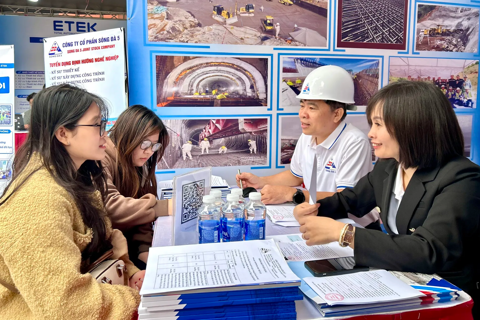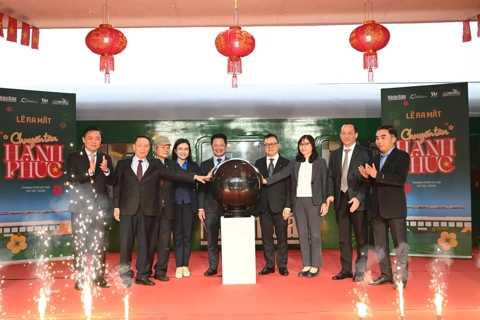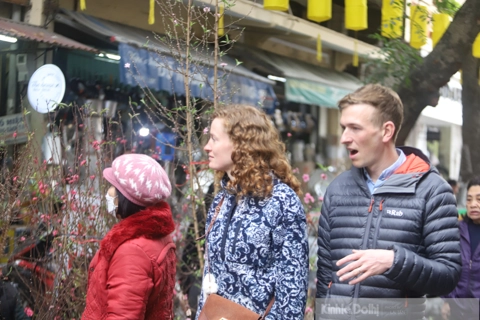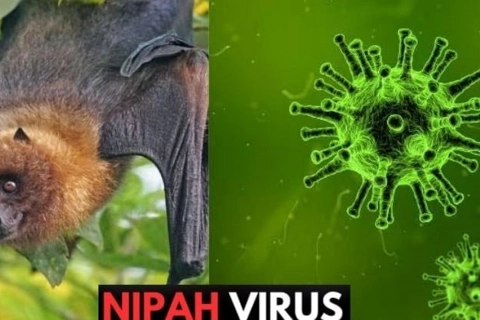Vietnam – exceptional example of fighting against HIV/AIDS: PEPFAR
Today, more than 70% of the estimated 240,000 people living with HIV in Vietnam receive antiretroviral (ARV) drugs through Social Health Insurance, funded by domestic resources.
Vietnam truly stands out as a global example of sustainability and domestic resource mobilization through the Social Health Insurance program in the fight against HIV/AIDS.
| Ambassador Dr. John Nkengasong, US Global AIDS Coordinator and Special Representative for Global Health Diplomacy speaks at the event in Hanoi on May 9. Photos: Minh Nguyen |
Over the last 10 years, the Government of Vietnam has taken seriously the responsibility for funding and administrating many components of its HIV response, including paying for all HIV treatment services and drugs in a way that addresses the need of people living with HIV (PLWH).
Vietnam ranks second in the Asia-Pacific region in the number of PrEP users, behind Australia with about 57,000 net users as of 2022.
“We appreciate the Government’s policy and financial leadership to accomplish this commendable goal,” Ambassador Nkengasong said.
Additionally, Vietnam has been very quick in adapting innovations and scientific advances to implement a comprehensive response. The recent and rapid expansion of pre-exposure prophylaxis (PrEP) services is a major achievement.
Another example is the K=K campaign. Since 2017, the Government of Vietnam has worked with stakeholders and community-based organizations to address HIV-related stigma and to jointly incorporate U=U (Undetectable=Untransmittable) or K=K in Vietnamese. The message empowered PLWH and affected by HIV with the knowledge that they could not transmit the virus if they were on effective treatment and maintained an undetectable viral load.
The health expert attributed Vietnam’s success to its ability to engage a wide range of stakeholders, from ministries and agencies at the national level to provincial agencies, academic and research institutes, social organizations, the fast-growing private sector, and dedicated community members and community-based organizations.
| US Ambassador to Vietnam Marc Knapper said at the ceremony. |
US stands with Vietnam in fight against HIV/AIDS
A year after the US Government launched the US President’s Emergency Plan for AIDS Relief (PEPFAR) in 2003, Vietnam became the first and only country in Asia to receive focused PEPFAR funding, US Ambassador to Vietnam Marc Knapper said at the ceremony.
Between 2004 and 2022, PEPFAR funded Vietnam with nearly US$900 million for the fight against HIV/AIDS.
In the 10 years that followed, the US was the largest donor to Vietnam’s national HIV response, contributing to 46% of the overall HIV budget, with additional funding from the Global Fund and other partners.
“Together, PEPFAR and Global Fund resources directly supported 90% of Vietnam’s procurement of life-saving antiretroviral (ARV) drugs to treat clients, giving people living with HIV a renewed chance to not only survive but to thrive,” Knapper said.
He said the results clearly demonstrate the joint efforts between PEPFAR and the Government of Vietnam to build a sustainable, high-impact national HIV response in Vietnam to accelerate progress towards the UNAIDS global targets to control the HIV epidemic by 2030.
The ambassador said with the accomplishments, Vietnam and the US can clearly point to their early collaborative work on Vietnam’s response to HIV and the support from PEPFAR that followed as a key element of the historic progress made in the strength of the relationship.
Sharing the same idea, Ambassador Nkengasong said the two sides continue to join hands in the next and final steps of the journey towards ending AIDS as a public health threat in Vietnam by 2030.
“Our goal is to support the national strategy for epidemic control by 2030, with the Government of Vietnam, both national and local, in the lead,” he noted.
| Representatives at the event. |
Unexpected results
With support from PEPFAR, Vietnam made significant progress since 2014 in taking ownership and leading its HIV response efforts. Today, more than 70% of the estimated 240,000 people living with HIV in Vietnam receive ARV drugs through Social Health Insurance, funded by domestic resources.
Overall, Vietnam’s program maintained an impressive 99% viral suppression rate in the 11 PEPFAR focus provinces in the Northern Economic Zone and the Ho Chi Minh City Metropolitan Region.
Beyond treating people with HIV/AIDS, Vietnam is focused on combination prevention, which allows clients to access comprehensive prevention services, including HIV counseling and testing, PrEP, and strategic communication designed to educate populations most at-risk, such as young men who have sex with men, and transgender women.
The Vietnam program has also adapted strategies to bring services closer to the clients. Before 2014, all HIV services in Vietnam were offered in the public sector and by healthcare workers. Today, there are more than 40 private clinics serving PLWH, the majority of them led by key populations in the communities.
This engagement of friendly community and private providers has led to greater choices for patients and increased uptake among key population clients. For example, about half of all PrEP users in Vietnam seek HIV services through private providers which represent only 25% of PrEP clinics in the country.
Vietnam is very close to achieving the 90-90-90 targets (90% of PLWH knowing their HIV status, 90% of people knowing their status on treatment; and 90% of people on treatment with suppressed viral loads.)
Vietnamese Health Minister Dao Hong Lan expressed her delight in the successful support of the US Government and PEPFAR, expecting more assistance for the achievement of 95-95-95 targets in the next years.
“I understand the importance of treatment for the survival and well-being of people living with HIV. And when taking part in HIV/AIDS prevention efforts, I realize the role that the local community plays in facilitating access to care, counseling, testing, and support. As a result, I established a clinic that is run by the community - it is My Home.” It’s the sharing of Nguyen Anh Phong – the founder of My Home clinic which was set up in Ho Chi Minh City in 2017. It's a model which is special for PLWH as it offers checkups, treatment, consultancy, sharing, or just listening to patients who are regarded as friends. Glink is the first private HIV clinic in Vietnam established in Ho Chi Minh City in 2009. Since its first operations, Glink so far has a network of seven clinics across the country located in Ho Chi Minh City, Hanoi, Can Tho, Dong Nai, and Nghe An. The network has offered PrEP to more than 20,000 people. In addition, Glink has developed HIV-related services like nutrition and psychology consultancy, exercises, opportunistic infection, among others. “I’m a person living with HIV. In 2020, I attempted to have a baby and after great support by PEPFAR, my child was born free from HIV,” Nguyen Thi Lan told PEPFAR volunteers. |


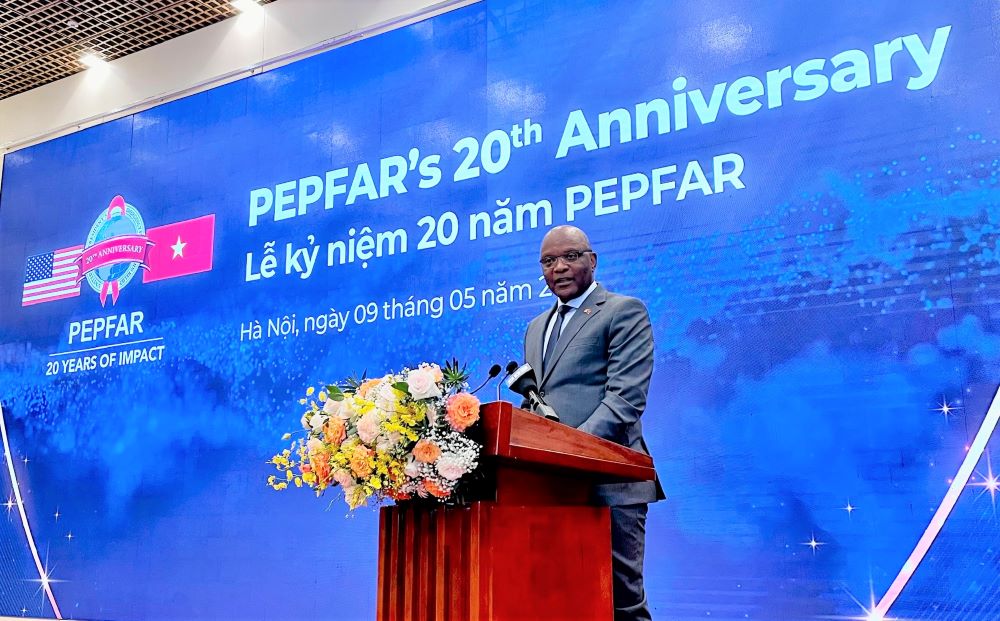
.jpg)


